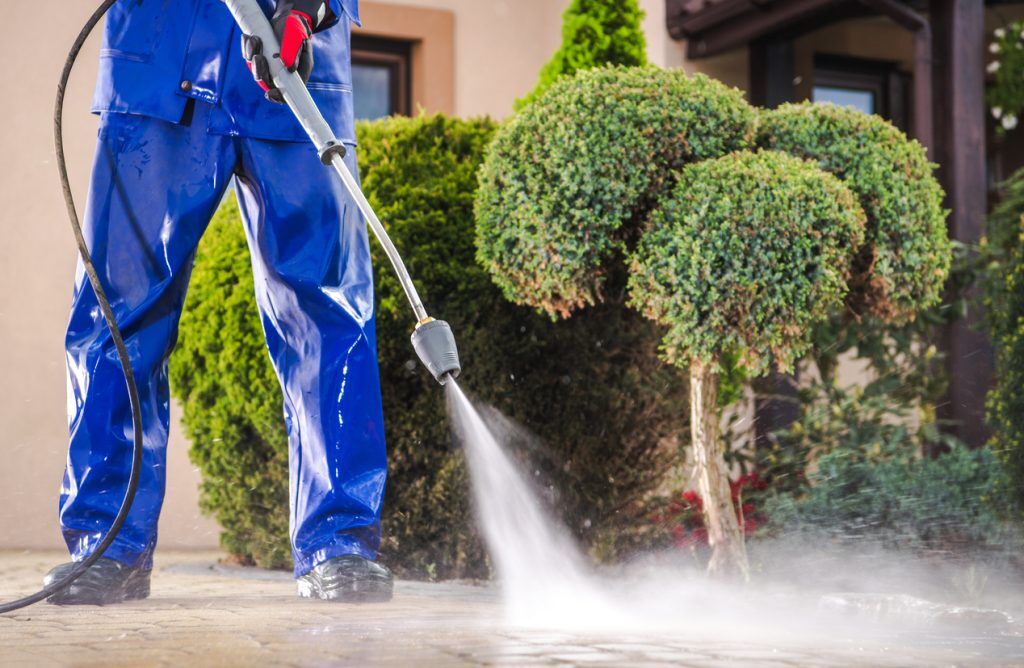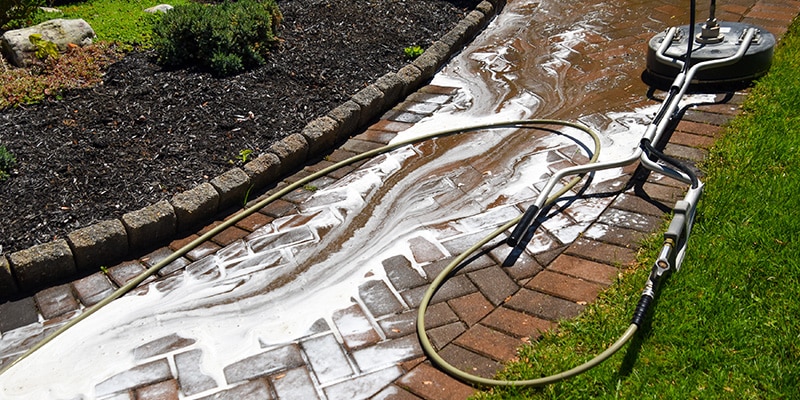The Ecological Advantages of Pressure Washing: A Cleanser Home and World
Pressure cleaning is greater than just an efficient cleansing technique; it symbolizes a dedication to ecological stewardship. By using high-pressure water, this method lessens the reliance on extreme chemicals, consequently minimizing soil and water contamination. It preserves water sources, utilizing significantly much less than traditional methods. Past water conservation, pressure cleaning additionally plays an essential function in improving air quality by getting rid of pollutants and irritants. Furthermore, it improves residential or commercial property longevity by protecting against surface area damage. What often goes undetected, nevertheless, is how these advantages collectively contribute to a lasting and healthier ecological community. What are the deeper effects of these advantages?
Decreases Chemical Usage
Minimizing chemical usage is one of the substantial ecological advantages of pressure cleaning. Pressure cleaning, on the various other hand, utilizes the power of highly pressurized water to achieve the exact same, if not much better, cleaning up results without the requirement for these dangerous materials (gutter cleaning kansas city).
The high-pressure water stream can remove and remove also the most stubborn pollutants, such as mold, mildew, algae, and accumulated dirt, from surfaces consisting of driveways, decks, and structure outsides. This minimizes the reliance on chemical detergents and solvents, thus reducing their environmental impact. Furthermore, pressure cleaning makes sure that surfaces are not just ostensibly tidy however deeply disinfected, avoiding the need for duplicated chemical applications with time. By embracing pressure cleaning, businesses and home owners can add to a cleaner environment, reduce their environmental footprint, and advertise a healthier ecosystem. This approach exhibits a effective and lasting method to keeping cleanliness and health.
Conserves Water

A regular yard tube, for example, can consume to 10 gallons of water per min, whereas pressure washing machines average around 2-5 gallons per minute. This stark difference illustrates the water conservation capacity of pressure cleaning, making it an extra lasting option for organizations and homeowners alike. By utilizing pressurized streams, these devices ensure that every drop of water is utilized effectively, reducing overall intake and decreasing waste.
Moreover, the performance of pressure washing translates to much faster cleaning up times, which better contributes to water preservation. Adopting pressure cleaning not only promotes cleaner surface areas but likewise sustains broader ecological sustainability by preserving one of our earth's priceless sources.
Enhances Air Quality
Pressure cleaning not just conserves water but likewise substantially boosts air quality, presenting one more crucial ecological advantage. The procedure properly gets rid of accumulated pollutants, such as mold, pollen, and mildew, from exterior surface areas. These impurities can become airborne, adding to bad air high quality and aggravating respiratory system problems like bronchial asthma and allergic reactions. By getting rid of these contaminants, pressure washing directly reduces the quantity of unsafe fragments launched right into the environment.
Moreover, pressure washing can aid alleviate the spread of spores and germs that thrive in wet, unclean environments - gutter cleaning kansas city. When surfaces are completely cleaned, the chance of these bacteria becoming air-borne is decreased, causing a healthier living setting. This is specifically vital in metropolitan locations where air high quality is frequently endangered by higher degrees of pollution
In addition, pressure washing gets rid of gunk and dust that can harbor unpredictable organic compounds (VOCs) VOCs are chemicals that evaporate at room temperature great post to read level and can cause considerable health problems, consisting of headaches and breathing problems. By efficiently cleansing surfaces, pressure cleaning lowers the presence of these dangerous compounds, contributing to a cleaner and more secure ambience. Thus, pressure cleaning plays an important function in enhancing air top quality and advertising total environmental wellness.

Stops Surface Damage
The preservation of structural integrity stands as an important environmental benefit of pressure cleaning. Surface areas such as timber, concrete, and block can collect dirt, mold, algae, and other impurities with time. These aspects are not only unpleasant but additionally add to the progressive wear and tear of materials. Mold and algae can preserve wetness, which leads to the decay of wood structures and the disintegration of concrete and brick surfaces. Routine pressure cleaning efficiently gets rid of these dangerous compounds, thereby protecting against surface damages and minimizing the need for constant repair work or substitutes.
Pressure washing eradicates these residues, ensuring that the surfaces remain robust and intact. By reducing surface area damage, pressure cleaning helps in maintaining the original toughness and appearance of different products, therefore contributing to a much more sustainable and environmentally-friendly living environment.
Boosts Residential Or Commercial Property Longevity
An essential advantage of pressure washing is its capability to considerably boost residential property durability. Normal pressure check here cleaning removes unsafe compounds such as mold and mildew, mildew, algae, and dust that accumulate on surface areas over time.
Moreover, the elimination of my blog harsh aspects like salt and toxins from surfaces such as concrete, timber, and steel can avoid the start of rust and decay. This aggressive maintenance technique makes certain that materials like home siding, decks, and driveways remain in ideal problem for a longer duration. Consequently, building owners can prevent constant upkeep cycles and the environmental effect related to the manufacturing and disposal of construction materials.
Furthermore, pressure cleaning can additionally expand the life of paint and coverings. By keeping surfaces clean, it minimizes the need for constant repainting, hence preserving resources and minimizing chemical runoff into the atmosphere. In general, pressure washing is a sustainable method that contributes to both home durability and ecological preservation.
Final Thought
In summary, pressure washing offers significant ecological benefits by lowering the dependence on extreme chemicals, saving water, enhancing air high quality, and stopping surface damage. This method not just expands the long life of materials but also contributes and sustains lasting techniques to a much healthier ecological community. By embracing pressure cleaning, a cleaner home and earth can be accomplished, thereby promoting both environmental stewardship and the health of bordering neighborhoods.
In addition to minimizing chemical usage, pressure washing additionally saves water, highlighting its environmental benefits. Embracing pressure cleaning not only advertises cleaner surfaces but additionally supports broader ecological sustainability by conserving one of our earth's valuable resources.Pressure washing not just conserves water yet likewise considerably boosts air high quality, presenting an additional essential ecological benefit. By effectively cleaning up surfaces, pressure cleaning decreases the visibility of these dangerous compounds, adding to a cleaner and safer environment.In summary, pressure cleaning offers considerable environmental advantages by lowering the reliance on rough chemicals, conserving water, boosting air quality, and stopping surface damage.